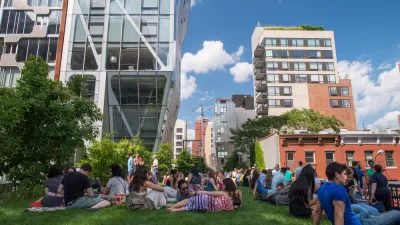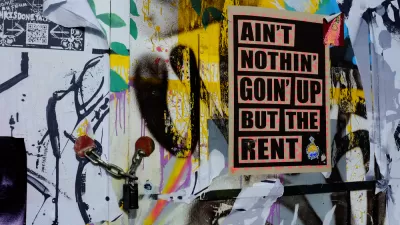The 10th anniversary and updating of Richard Florida's "Rise of the Creative Class" has brought about a re-evaluation of "creative class" urbanism. Will Doig surveys a series of popular essays that question Florida's highly influential arguments.
A flurry of articles in blogs and journals over the last couple of months have argued for the failings of different elements of creative class theory. The most recent of these, appearing in the literary journal The Baffler, "took aim at urbanism's fetish for 'vibrancy,' and called the coolness-will-save-us model a 'Ponzi scheme' that needs to be stopped," notes Doig.
He suggests there is a growing conversation, and concern, "that much of today's
urbanism, even when its goals are lofty, is too muddled with buzzwords,
corporate-speak and privileged points of view." While counter-arguments to Florida often dwell on semantics rather than substance, Doig argues that at the heart of the criticisms lies a spreading anxiety, "that
some of this stuff - the streetcars, the pop-up cafes, the activated
spaces, the 'vibrancy' - is frivolous and insubstantial."
And the fact that many of these dissenting articles appear in "small publications, written by people who aren't as invested in urbanism as a movement," Doig seems to argue, is their greatest credential. Planners, as a lot, are remiss if they aren't invariably suspicious of the type of sure-minded group-think that brought about the disastrous urban renewal schemes of the 1950s and 60s. And Doig seems to play on this suspicion by making an analogy between these articles and the work of "local activists" who by the mid 1960s, "had been writing for years in
community newspapers about the destructiveness of urban renewal
policies, that they were doing more harm than good."
"Meanwhile," Doig continues, "the New
York Times was still running
Op-Eds promoting 'the long-standing national goal of tearing down all
slums and providing every American family with ‘a safe, decent and
sanitary home.''
Because, "The Times, along with some of the brightest minds of that generation,
was wrong about cities," concludes Doig, "Some of the ideas that are being implemented [now]
might also be wrong..."
FULL STORY: Hipsters won’t save us

Planetizen Federal Action Tracker
A weekly monitor of how Trump’s orders and actions are impacting planners and planning in America.

Restaurant Patios Were a Pandemic Win — Why Were They so Hard to Keep?
Social distancing requirements and changes in travel patterns prompted cities to pilot new uses for street and sidewalk space. Then it got complicated.

Map: Where Senate Republicans Want to Sell Your Public Lands
For public land advocates, the Senate Republicans’ proposal to sell millions of acres of public land in the West is “the biggest fight of their careers.”

Maui's Vacation Rental Debate Turns Ugly
Verbal attacks, misinformation campaigns and fistfights plague a high-stakes debate to convert thousands of vacation rentals into long-term housing.

San Francisco Suspends Traffic Calming Amidst Record Deaths
Citing “a challenging fiscal landscape,” the city will cease the program on the heels of 42 traffic deaths, including 24 pedestrians.

California Homeless Arrests, Citations Spike After Ruling
An investigation reveals that anti-homeless actions increased up to 500% after Grants Pass v. Johnson — even in cities claiming no policy change.
Urban Design for Planners 1: Software Tools
This six-course series explores essential urban design concepts using open source software and equips planners with the tools they need to participate fully in the urban design process.
Planning for Universal Design
Learn the tools for implementing Universal Design in planning regulations.
Heyer Gruel & Associates PA
JM Goldson LLC
Custer County Colorado
City of Camden Redevelopment Agency
City of Astoria
Transportation Research & Education Center (TREC) at Portland State University
Camden Redevelopment Agency
City of Claremont
Municipality of Princeton (NJ)




























